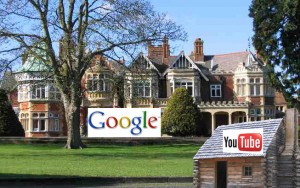Is Google Squandering YouTube’s Potential? Yes, So…
“YouTube’s future is being held back is the typical innovator’s dilemma, or rather, billionaire’s dilemma,” writesAshkan Karbasfrooshan is CEO of WatchMojo.com. I included some of Karbashfrooshan’s pieces in Beyond Viral, and he’s one of the authoritative writers about the online-video industry and media monetization.

Indeed YouTube is but a toy kiosk in the Google “Mall of Americas.” Before I provide my 2 cents, here are some important highlights of his recent piece (with my comments in italics). His article was spawned, in part, by a “Video Forecast 2011” piece by AlphaBird’s Alex Rowland.
- Google is generating way too much money from its “traditional” search business ($30 billion) to care about radically owning the new video space (which is a small portion of the $2.5 billion Google counts as “display”).
- While YouTube commands 45% of the video streams in the U.S., it is unlikely that it will generate $600 million from video ads in 2010 (or 40% x $1.5 billion). (Hulu, he says, did $240 million… and with a tiny percentage of streams).
- YouTube correctly identified ad agencies and Fortune 500 marketers as those who would turn YouTube into a billion-dollar business. However, since Google had little experience in selling to ad agencies before it acquired YouTube, growing video revenues took a lot of time to scale.
- But instead of allowing content partners set prices based on actual market dynamics (demand and supply), YouTube implemented a set of obstacles and requirements that have made selling one’s YouTube channel all but impossible. YouTube did this, I believe, in an attempt to thwart content producers from owning the relationships with media planners and buyers. After all, if YouTube opened up its site, it would lose contact with advertisers and become a mere dumb pipe. (Indeed Google has been known to dismiss the role of the media buyer as somewhat useless intermediary… however the “dumb pipe” of Google’s paid-search network isn’t so dumb).
- Some would argue that if leading YouTube content provider Next New Networks’ indeed sold to YouTube (a rumor that spread in recent weeks, such as with this LA Times piece), it would be more of a capitulation than coup, for NNN relies so much on YouTube that it cannot possibly remain a going concern if it was not part of YouTube.
Now the WatchMojo CEO is a YouTube content provider, and has reduced the percentage of his company’s own inventory via YouTube from 45% to 15% in just the last past few months (by expanding his distribution beyond YouTube, since his YouTube audience has not contracted). He says YouTube is creating an “opening for others to win the bigger ad dollars,” and names DailyMotion, Metacafe and Facebook as potentials.
Now my thoughts: this isn’t a lone voice. I’ve heard this or similar perspective from content creators, advertising agencies, industry watch dogs and even some variations from YouTube/Google employees.
I would contend that Karbasfrooshan is more correct than controversial, and that Google is perhaps even “strategically ignoring” online-video’s near-term growth potential because it has far more critical business “levers.”
- Google has a cash cow in search-engine advertising, and is broadening into other mediums especially mobile. I expect YouTube’s growth to continue (it’s usually the case with the market leader), but its share of online-video display dollars will decline dramatically.
- Still, YouTube will continue to flourish via the middle market, lower maintenance, and “self serve” portion of the marketplace. This is almost certain without a significant “course correction” that does not appear imminent or within Google’s DNA.
- If Facebook begins to display video and share advertising revenue with content creators, I would imagine most — from Discovery to Annoying Orange — would start posting on Facebook quickly, migrating their audience, and even staggering/delaying content to YouTube (the way some providers like The Onion and College Humor do… first posting on their own sites, then weeks later posting on YouTube).
- Just as I don’t think my own content cannot survive and flourish outside YouTube (at least alone, hence my signing with Next New Networks), I do not believe Google is poised to grow or even maintain YouTube’s share of the online-video advertising budgets even remotely in relationship to its percent of video streams.
- The exception will be small companies and middle markets, or advertisers who are prone to buying via Adwords. Currently the vast majority of YouTube advertising dollars (with the exception of individual campaigns and homepage takeovers) are almost entirely driven by Adsense Adwords. You heard me correctly, and that’s a sad statement about Google/YouTube’s ability to sell direct to brands and/or via partners and agencies.
Large content creators and brands will and should want a strong platform partner which puts the audience needs and preferences first, but theirs at a close second.
So the answer to this post’s title is “yes… Google is squandering YouTube’s potential right now.” It is almost inarguable truth that YouTube is not leveraging the strength of Google and its global salesforce, and not winning the hearts and minds of Madison Avenue. It follows, therefore, that the stewards of large digital media budgets are now seeking — and will continue to pursue — alternative online-video advertising options for innovative programs beyond prerolls.
I’d expect to see AOL and Yahoo, if not Facebook, knipping away at Google’s online-video Achilles heal. Google, after all, is not a media property at heart… it’s a sleuth of engineers producing innovative change. Given that identity, Google can’t be underestimated as a bold market force that will continue to shake the online-video industry in ways far more interesting than hundred-million-dollar media buys, which are akin to vending-machine revenue at a casino.
In the meantime, content creators should:
- Ask YouTube to facilitate and encourage them to prevent agency buyers from feeling YouTube’s thorns. Likewise they need to aggregate to achieve sufficient strength to command the interest of digital buyers unless their niche is remarkable.
- Maintain good relationships with YouTube people, recognizing that many of YouTube’s shortcomings are out of their control.
- Diversify their distribution to include some of the smaller properties… especially those that grow. YouTube’s incentive to innovate for advertisers depends on market competition.
- Derive income directly via sponsorships… which is no longer discouraged by YouTube, a video platform.
- Pay close attention to what Google is doing with online video that has far greater potential than YouTube or any individual media property alone.

“Just as I don’t think my own content cannot survive and flourish outside YouTube…”
Confusing. I can’t tell if the double negation is intentional or not.